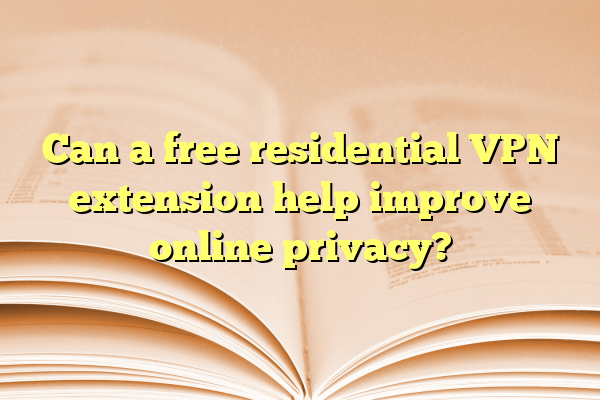
Can a free residential VPN extension help improve online privacy?
Imagine browsing the internet without worrying about someone snooping on you. Sounds great, right? That’s what people hope for when they use a VPN. Especially a free residential VPN extension. But what exactly does that mean—and can it really help your online privacy?
Let’s break it down in a fun and simple way.
Contents
What’s a VPN Anyway?
A VPN stands for Virtual Private Network. In plain words, it creates a secret tunnel between your device and the internet. That way, no one can peek into what you’re doing online.
When you use the internet without a VPN, it’s like shouting your secrets in a crowded room. Everyone—like your internet provider, hackers, or advertisers—can hear you. But with a VPN, it’s like whispering into a locked diary. Only you and the website you’re visiting know what’s going on.
What’s Special About a Residential VPN?
A residential VPN is a bit different from regular VPNs. It uses IP addresses that come from real homes instead of big data centers.
Why does that matter? Because it looks more “natural.” Some websites block regular VPNs. But residential VPNs are sneakier. They blend in with everyday internet users.
Think of it like a spy in disguise. Instead of wearing a black suit and sunglasses, they dress like your neighbor. Much harder to spot!

Can a Free VPN Extension Do the Trick?
Free stuff is cool. But sometimes, if you’re not paying with money, you’re paying with your data.
Here’s what you should know about free residential VPN extensions:
- Pros:
- Easy to install (just click and add to your browser)
- Often no sign-up needed
- Can help hide your location
- May bypass some website blocks
- Cons:
- Some might log your activities
- They can be slower than paid VPNs
- Privacy policies can be tricky
- Limited server choices
Does It Really Improve Online Privacy?
Yes… and no.
If it’s a good and trustworthy VPN provider, even a free extension can help. It can hide your IP address, keep your data secure, and make it harder for people to track your online moves.
But if it’s a shady provider, they might sell your data to advertisers. Or even worse—hackers!
The trick is knowing who you’re trusting.
What to Look for in a Free Residential VPN Extension
Before adding that shiny new extension to your browser, check for these things:
- No logging policy: Make sure they don’t keep track of what you do.
- Good reviews: Check online what other users say.
- Transparent privacy policy: Know what they’re doing with your data.
- Encryption: Your data should be scrambled so nobody else can read it.
Don’t be afraid to dig a little. A few minutes of research could save your privacy.
Extra Tips for Online Privacy
A VPN helps, but it’s not magic. Here are more ways to boost your privacy:
- Use strong, unique passwords
- Enable two-factor authentication on your accounts
- Keep your apps and software up to date
- Don’t click on sketchy links

The Verdict
A free residential VPN extension can improve your privacy—if it comes from a solid, honest provider. It’s like wearing a mask online to keep your identity safe.
But don’t rely on it alone. Like putting on a raincoat, it helps keep you dry—but it won’t stop a storm.
So yes, a free VPN extension can be a useful piece of your privacy toolkit. Just make sure it’s the right one. Stay curious, stay cautious, and keep surfing safely!
